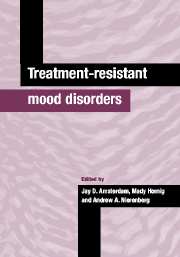Book contents
- Frontmatter
- Contents
- List of contributors
- Preface
- Part I The clinical problem
- Part II Biological basis
- Part III Treatment approaches
- 8 Selective serotonin reuptake inhibitors and serotonin–norepinephrine reuptake inhibitors in treatment-resistant depression
- 9 Conventional and second generation monoamine oxidase inhibitors in treatment-resistant depression
- 10 Drug combination strategies
- 11 Electroconvulsive therapy in medication-resistant depression
- 12 Thyroid augmentation
- 13 Cognitive therapy and psychosocial interventions in chronic and treatmentresistant mood disorders
- Part IV Special patient populations
- Part V Economic and ethical issues
- Index
- Plate Section
12 - Thyroid augmentation
from Part III - Treatment approaches
Published online by Cambridge University Press: 25 March 2010
- Frontmatter
- Contents
- List of contributors
- Preface
- Part I The clinical problem
- Part II Biological basis
- Part III Treatment approaches
- 8 Selective serotonin reuptake inhibitors and serotonin–norepinephrine reuptake inhibitors in treatment-resistant depression
- 9 Conventional and second generation monoamine oxidase inhibitors in treatment-resistant depression
- 10 Drug combination strategies
- 11 Electroconvulsive therapy in medication-resistant depression
- 12 Thyroid augmentation
- 13 Cognitive therapy and psychosocial interventions in chronic and treatmentresistant mood disorders
- Part IV Special patient populations
- Part V Economic and ethical issues
- Index
- Plate Section
Summary
Introduction
For the greater part of this century, thyroid hormones have been considered as viable treatments for patients with mood disorders, particularly those with treatment- resistant illness. This interest in the therapeutic effect of thyroid hormones arises from the well-established association between abnormalities of the thyroid axis and psychiatric symptomatology, especially alterations in mood. In particular, the association between clinical thyroid disease, both hyperthyroidism and hypothyroidism and mood disturbance has been well documented. Specifically, hypothyroidism is commonly associated with symptoms of depression (Hall, 1983; Whybrow et al., 1969) whereas, in hyperthyroidism, there is a broader range of psychiatric symptomatology including anxiety, mood lability, cognitive impairment as well as symptoms ofmania and psychosis (Fava et al., 1987; MacCrimmon et al., 1979; Weller, 1984; Kathol et al., 1986; Jefferson, 1988). In addition, hyperthyroidism may also be associated with features of depression (Jefferson, 1988). This rich clinical literature (Hall, 1983; Whybrow et al., 1969; Fava et al., 1987; McCrimmon et al., 1979; Weller, 1984; Kathol et al., 1986; Jefferson, 1988) documenting an association between psychiatric illness and thyroid disease has also shown that successful treatment of the thyroid disease is usually although not always associated with resolution of psychiatric symptoms, especially in patients with hypothyroidism (Wolfson & Jefferson, 1985; Loosen, 1986).
The above-mentioned literature in patients with clinical thyroid disease has certainly provided one of the strong clinical and theoretical rationales for the use of thyroid hormones in the treatment of depression. In addition, other clinical and preclinical observations also provided support for treatment of depression with thyroid hormones.
Keywords
- Type
- Chapter
- Information
- Treatment-Resistant Mood Disorders , pp. 239 - 251Publisher: Cambridge University PressPrint publication year: 2001
- 2
- Cited by

